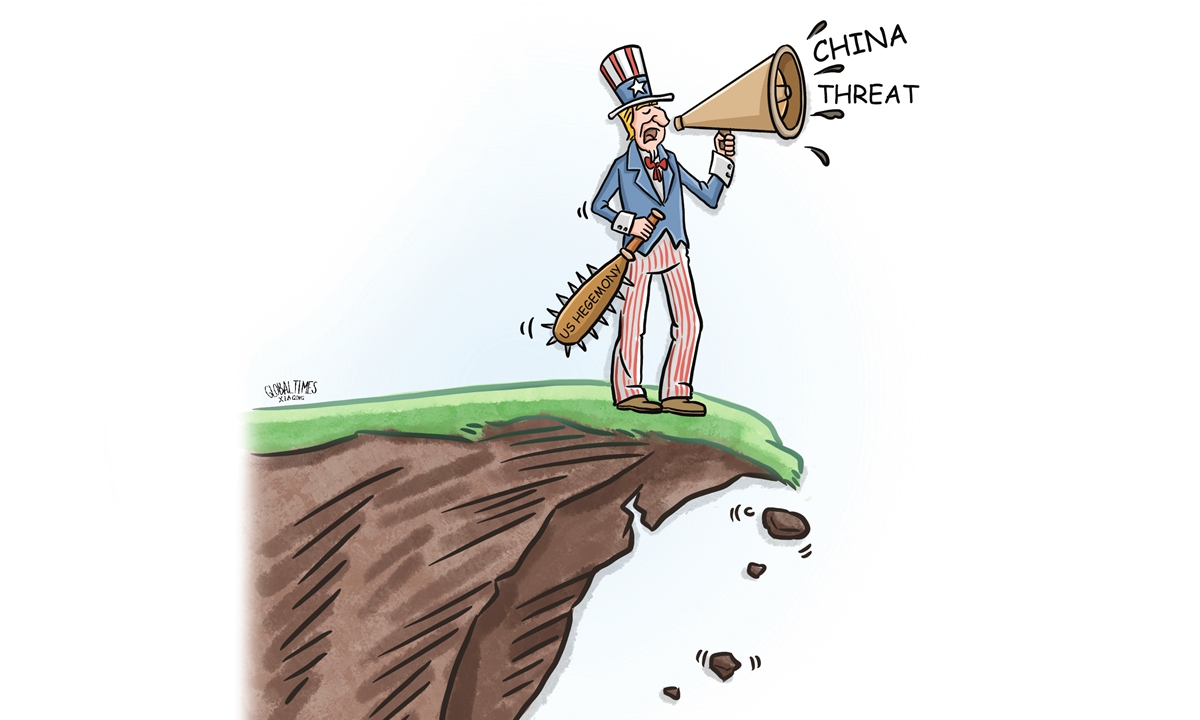
Illustration: Xia Qing/GT
Editor's Note:The label of the "China threat" is itself an effort by the US to undermine China and sustain US dominance in the world. Joseph Solis-Mullen (Solis-Mullen), a political scientist and economist at the Libertarian Institute, recently published a book titled The Fake China Threat and Its Very Real Danger to debunk the myth of this fabricated theory. In an interview with Global Times (GT) reporter Wang Wenwen, Solis-Mullen talked about why he wrote this book and the danger of this narrative to the US itself.
GT: How did you become interested in China?
Solis-Mullen: My educational background is very diverse. I'm a political scientist, an economist, and a professor of history. I was preparing to do some non-Western history courses several years ago, especially focusing on China. I read the corporate press every day, such as the Wall Street Journal and Washington Post. I started to notice that the tone of the coverage was changing. You no longer come across references to China as a strategic partner or a pillar of the rules-based order.. You started seeing China portrayed more as a threat, and it got worse and worse. Even if you do a Google search, you can find that the different adjectives that are used to describe China have varied significantly over time, when really there hasn't been a great deal of change in the behavior of China toward its neighbors.
From my own perspective, the unipolar moment in the latter half of the 20th century was an anomaly in history. The US has got to learn how to live with and deal with large, powerful states who do not acquiesce to US security prerogatives.
As I started reading everything I could about China, I found a cottage industry had grown up of books talking about how threatening China was. When I looked into the background of these people, most of them were being paid by the weapons manufacturers in our own country. And then they write books and articles about how we're in such great danger from Russia or China, anything that seems to justify buying more of their weapons.
We have this complex here that doesn't really serve the American people's interest. I felt that this narrative was being consumed by these hawks who were desperate to fight someone to justify the continuation of the militarized foreign policy that America has adopted increasingly.
GT: Why did you write the book?
Solis-Mullen: I was trying to speak to people who are genuinely terrified, because they don't really know anything about China. China looks large. It's very strong and powerful. China is relatively much stronger than it was. It's much wealthier than it was and is growing. But I think that people just need to calm down and look at the facts, such as China's strategic situation and its economic situation.
Historically, large regional powers try to dominate their region. The US is no exception. So I think it's a case of looking in the mirror and not projecting what you see onto China. I try to explain to people in the book that China's military doctrine is based on area denial to try and keep people out of China's immediate space. The US' own policy is the one that's based on global domination. The US is prepared to fight a war anywhere over anything at any time. That is not the capacity that China is building up. Realistically, our government is bankrupting itself. It's only a matter of time before this attempt at global domination is no longer sustainable.

Joseph Solis-Mullen Photo: Courtesy of Solis-Mullen
GT: How dangerous is this "China threat" theory that is prevailing in the US? Why is it necessary to dispel this myth?Solis-Mullen: It's very dangerous. If a conflict happens - people always say it won't go nuclear. First of all, you don't know that it won't go nuclear. And even if we say it will stay below the nuclear threshold, conventional wars between major powers are horrifying. My grandfather fought in one, my father experienced a more minor but equally serious conflict. These are horrible. We're talking about potentially millions of people dying.
It's horribly dangerous, especially because it would be a fight over the Taiwan question, and it would be a fight the US could not win. In the 1970s this was all set down. Beijing is the government of China, and Taiwan is part of China. These agreements were made. Our entire relationship is built on these agreements being carried out in good faith. Now, Washington has decided, "We don't really like those agreements anymore."
But I know America's security is not served by fighting over Taiwan. Our economic prosperity is not dependent on Taiwan. In fact, what our economic prosperity is dependent on is there being no war. War does not make us rich. And a conflict over the Taiwan question involving Beijing and Washington would be especially horribly disruptive to the global economy.
GT: How can American society bridge the understanding deficit of China?
Solis-Mullen: Unfortunately, they only have access to books and media that come out from people who are willing to pay to have the books written and who have a vested commercial monetary interest. As is always the case, the peace caucus and the caucus for reason is very small, because what we have here is a problem of concentrated benefits and very diffuse costs. It costs all of us about $25 a month. But it's worth billions of dollars to these companies and to these Congress people who literally don't even read the bills that they sign. That's the level of tragedy that we're at right now.
GT: After your book was published, what feedback did you get? Do you get more criticism or praise?
Solis-Mullen: I got 50-50. Some people said "thank you so much for saying that," while others - I just got an email recently from someone just going off about it. Most of the stuff that people come with is super alarmist, like "the CPC is trying to take over America and hook all Americans on drugs and steal all our farmland." But actually, various Chinese entities own less than 1 percent of all American farmland, and it's a smart investment. And then deindustrialization policies and the fentanyl thing. They say China stole all the jobs. That's so crazy. Maybe Washington's policies were what deindustrialized the country. Maybe it was Washington's policies that started a drug epidemic in the country. The US always needs someone to blame for all its bad policies.
Most people are just not going to change their minds even when you present them with facts. The number of people who can have a conversation and be convinced by the other is very small. Most of them are in actual academia, which is where I work.
It's definitely tough because the average person in the US is very upset over a variety of things, such as inflation and cost of living. Washington is desperate to blame anyone else for anything, to distract them with anything.
GT: With wars being launched by the US or where the US was involved in wars, do you think US rhetoric, such as democracy and human rights, has lost its appeal?
Solis-Mullen: If you look at where the US was at the end of the Cold War versus where we are now, all the wars we fought made us less safe, killed lots of people and made us look bad.
At the same time, public opinion needed to be manipulated. We needed to be lied into these wars, which made democracy look bad. Washington has made its own brand look bad. We'd be in a lot better spot right now if we had not entered into these wars, geopolitically and economically. Economically we would be doing much better. Military spending is almost a total bust except for the handful of companies and their shareholders who benefit.
There are reasons the wars were actually fought, but it wasn't for human rights and democracy. The Middle East wars, apart from trying to help Israel, which totally backfired, were fought so that the US could maintain a presence in the Middle East to control access to the oil supply. Not because we need oil. We here in America have tons of oil and we get most of what we import from Canada and Mexico. It was to be able to shut off the oil in the event of a conflict with China or someone else.
Now regarding the Russia-Ukraine war: The wars in the Middle East got Americans used to this idea of war just going on in the background and going on forever, like the war in Afghanistan that went on for 20 years. We cannot tolerate Washington doing things like that to major powers like Russia. It is dangerous and unacceptable. Ukraine is not vital to US national security. Washington has already provoked a new cold war, and like the first it is going hot all over the place, putting us all at risk and over things far from central to our own security but paramount for that of Russia. Washington's policy in that regard has been a total disaster and failure.
But look what the ex-ambassador to Russia, Michael McFaul, still a prominent commentator and academic, said the other day. He indicated that sanctions didn't work, but then his very next sentence was "we need more sanctions, better sanctions, and better implementation." Sanctions didn't break Cuba, Iran or Venezuela. Are they supposed to break Russia or China? These policies are a bust, and it is up to Americans to start demanding new and better ones, ones geared toward cooperation and the prosperity of all, not attempted global hegemony.
